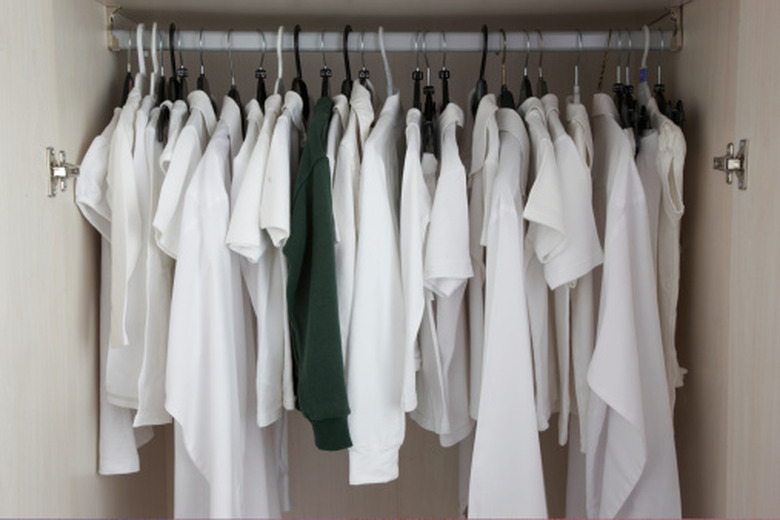How To Control Closet Humidity
Things Needed
-
Pipe insulation
-
Louver-paneled doors
-
Dehumidifier
-
Exhaust fan
-
Desiccants
-
Light
Humidity in closets creates an environment where mold and mildew can grow on shelves, linens, clothing and walls. Humidity in a closet also leaves stored items smelling musty. Typically, closed closets have restricted airflow that keeps the humidity in the closet. Humidity in the air is typically higher in basement and bathroom closets than other closets in the house. Certain regions of the country have higher humidity levels and regardless of the closet location suffer from dampness. Controlling closet humidity is necessary to keep the closet free of odor, mold and mildew.
Step 1
Inspect the interior of the closet for indications of leaking water from pipes or air conditioning ducts. Repair the leaks to minimize the moisture and humidity. If pipes are sweating, wrap the pipes with insulation to block the escape of moisture.
Step 2
Replace flat panel closet doors with closet doors that have a louver panel. Space between the slats allows air to move in and out of the closet.
Step 3
Put a dehumidifier inside the closet to pull moisture and humidity from the air. If there is not enough space in the closet for a dehumidifier, place the dehumidifier as close as possible to the closet. Empty the dehumidifier's collection tray at least once a day to keep the water from becoming stagnant.
Step 4
Install an exhaust fan in the closet to pull moist air from the closet and minimize humidity levels.
Step 5
Keep the closet door open whenever possible to allow fresh air to move throughout the closet. Point a fan at the interior of the closet to move the air around, lessening the level of moisture and humidity.
Step 6
Store desiccants, such as a calcium chloride-based moisture-absorbing product like silica gel, baking soda, chalk or washed charcoal in the closet to soak up the moisture and humidity.
Step 7
Turn a light on inside the closet for four to six hours per day to heat the air and burn off excess moisture and humidity.
Tip
Only store dry items in the closet; damp items increase humidity levels.
Warning
Uncontrolled moisture and humidity can lead to mold, mildew and rot inside the closet.
References
- "New Fix-It-Yourself Manual: How to Repair, Clean, and Maintain Anything and Everything In and Around Your Home"; Reader's Digest Editors; 1996
- "Heloise from A to Z Updated"; Heloise; 2004
